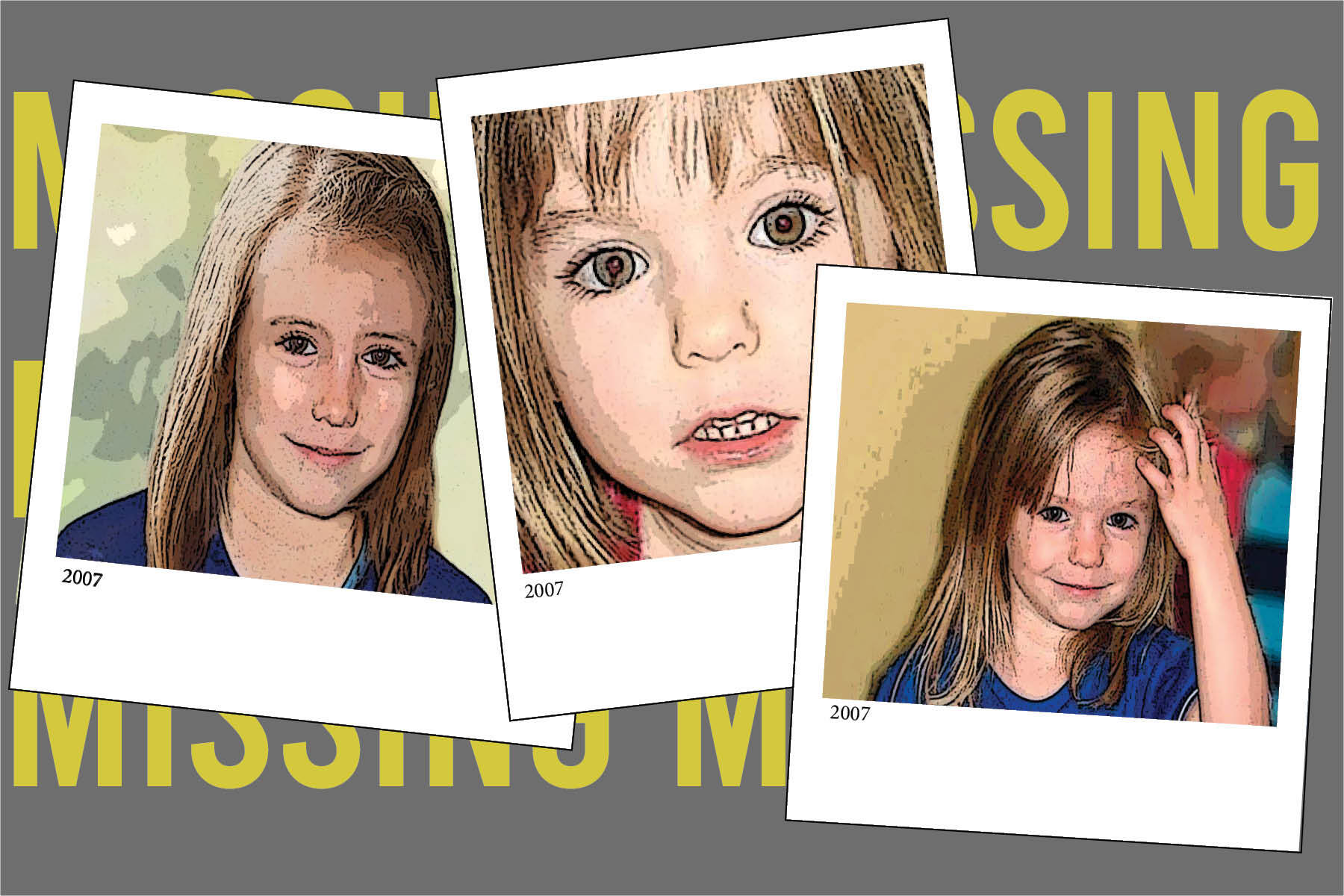This month, investigators revealed that they have discovered a promising suspect in the 2007 disappearance of Madeleine McCann. The British 3-year-old vanished from her family’s vacation apartment in Praia da Luz, Portugal, in 2007. Madeleine’s parents, Kate and Gerry, were having dinner with friends less than 200 feet away from the apartment in which Madeleine and her two younger siblings slept. The parents went to check on the children every so often throughout the night. On one of the routine checks, Kate discovered that Madeleine was gone.
A media circus ensued as the McCanns desperately tried to find their daughter. The search for Madeleine McCann quickly made headlines worldwide. Her disappearance became the most heavily reported missing person case in modern history. Everyone from Simon Cowell to the Pope became personally invested in finding her. Sadly, despite the international attention the McCann case received, little Maddie has never been found.
The recent development in the search for a suspect seems to be the closest authorities have come to answering what happened to Madeleine that night in 2007. Investigators are currently indicating that Madeleine was most likely kidnapped and murdered shortly after she was taken. This is, although, still just a theory and has not been confirmed by evidence.
Madeleine’s tragic disappearance is something that no parent should ever have to go through. However, the extraordinary amount of attention her story has received over the past 13 years reveals the disparities between how society learns about and treats missing children. The reality of our world, which brims with racial and socioeconomic injustices, is that if Madeleine McCann were not rich and white, few would know her name.
Many factors make the McCann disappearance ripe for attention, particularly its lack of conclusion and its many twists and turns throughout the years. At one point early on in the investigation, the Portuguese police suspected Kate and Gerry had murdered Madeleine and were trying to cover it up. Nonetheless, it should not come as a surprise that the missing daughter of white, affluent doctors held space in the minds and hearts of people all around the world for 13 years.
Kate and Gerry McCann had the money and resources to make Madeleine’s name and face known to anyone who even glanced at the news. For example, in the days following Madeleine’s disappearance, her parents secured a relationship with Sky News that led to their story making the front page of multiple newspapers daily for months. Widespread coverage of the disappearance eventually resulted in a lot of negative press for the parents once the Portuguese police named them as suspects. Ultimately, however, it only helped the McCann’s cause, as it made Madeleine’s story known for years to come.
Any parent would do everything they could to find their missing child in a situation like that of Kate and Gerry. Unfortunately, people’s “everything” is different based on the obstacles they face due to their race and socioeconomic status.
In addition to securing international media publicity, Kate and Gerry’s “everything” involved having enough money to hire investigators and lawyers to ensure that authorities in multiple countries were putting in proper efforts to find Madeleine. Due to the extraordinary publicity, countless donations poured into the Madeleine Fund, which the family set up to help financially support the search. Additionally, celebrities like J.K. Rowling contributed to a fund set up to rewarMcd those who came forward with any information, which totaled over $3.2 million.
The McCanns’ tragic experience also plays into a “fear of the foreign” narrative, which helped contribute to the attention the case received. Madeleine disappeared while on vacation in a Portuguese beach town thousands of miles from her home. The image of an innocent young white girl being ripped from her family in a foreign country made for the perfect news story to capture the attention of white audiences. If something like this could happen to a couple of accomplished British doctors, it could happen to anyone.
Children of color who go missing do not get this same treatment from the media. For example, in 2015, 35% of missing children in the U.S. were Black. But that year, the media only referenced Black missing children 7% of the time when covering missing children cases. This gross shortage of media coverage means that children of color who go missing have a much smaller chance of ever being found given the lack of public knowledge about their disappearance.
Additionally, children of color who go missing may be from families who do not have the money or resources to hire lawyers and private investigators to aid in their search. Although they can call the police, many families of color hesitate to do so given the history of police brutality against minorities.
Even if they do call law enforcement, police are more likely to label minority children as runaways than put time and effort into finding them. These unjust circumstances mean that society does not just forget, but simply never knows the names of the many children who are ripped from their families just as Madeleine McCann was.
The story of Rui Pedro helps illustrate the injustices that children of color face when they go missing. Rui was an 11-year-old Portuguese boy — someone many would not consider as “white” as McCann — who went missing in March of 1998. He went on a bike ride in his hometown of Lousada and was never seen again. Despite having vanished without a trace in the same country as Madeleine did, the media did not pay nearly as much attention to Rui Pedro’s case as they did to Madeleine’s.
The 2019 Netflix documentary about Madeleine’s disappearance tells Rui’s story as a way to underscore just how much attention her case received compared to other children who have also vanished. The president of the Portuguese Association of Missing Children, Patrícia de Sousa Cipriano, discusses Rui Pedro in the documentary.
She explains, “The way the Madeleine McCann case was conducted, by the authorities in Portugal and the authorities in Britain, was so different from the other cases, in terms of resources, in terms of funding, in terms of media. And I started to wonder, ‘What if the other children had the same attention? Could they be here right now?’”
Cipriano’s statement summarizes the injustices in how the world views different missing children. The sad reality is that the disappearance of a child like Rui Pedro would never receive as much media attention as the story of Madeleine McCann. Rui was a Portuguese child who vanished in his small hometown. His parents had no power to make his case internationally known in the way the McCanns could. People around the world are much more likely to see Rui Pedro’s story as simply an unfortunate event that occurred to a Portuguese family in a small town far away.
Rui’s story is less shocking and less important in the eyes of the public because he wasn’t a white Anglo child of doctor parents who disappeared while on vacation. Therefore, the media saw no reason for his story to continually make headlines as Madeleine’s did. The same could be said for the countless children of color who go missing every year whose names the world never knows.
Rui Pedro’s mother, Filomena, identified his picture when authorities busted an international online pedophile ring, but he is technically still missing since he has never been found physically. His mother, much like Kate McCann, must be suffering immense pain. Both mothers have no idea whether their children are dead or alive. Even if Madeleine and Rui are alive, their mothers know that they are most likely living in horrific situations.
And yet, the McCanns have been able to attract 13 years of consistent media attention to Madeleine’s disappearance, all because of their differences from Rui’s family in class, situation and perceived race. Though Madeleine and Rui vanished all the same, Madeleine’s name has never disappeared from the headlines, while Rui’s was never there to begin with.
The long-lasting results of the McCanns’ efforts are astounding. Over 13 years after Kate opened the door and saw her oldest child’s bed empty, Madeleine has been the subject of multiple books, an eight-part Netflix documentary and even a recent podcast. In the face of the new emerging developments about her case, recent activity on Reddit and Twitter has proved that people are just as invested in learning what happened to Madeleine now as they were in 2007.
As Cipriano points out, if the media and general public placed the same spotlight on other missing children, how many could have been found?
Look at any list of famous missing children and you will find that they are mostly — and usually entirely — composed of white kids. The lack of coverage of missing children of color is an extraordinary injustice given that minority children make up 65% of all non-family abductions in the U.S. alone. If these children received even a sliver of the attention Madeleine received when she went missing, there is a chance that they could be reunited with their families much more often.
The world should not fault the McCanns for putting in extraordinary effort to find their daughter, as any parent would if they could. However, Madeleine’s story is an important reminder that parents of missing children of color often lack control over the way the rest of the world sees and cares about their child. They may lack the money and resources to do so, but furthermore, many people simply refuse to see that the disappearance of a child of color is as egregious as the disappearance of a white child such as Madeleine McCann.
Parents of children of color who go missing face immense systemic barriers. These obstacles make it so their child’s story may never even be mentioned on the local news, never mind become cemented in the memory of anyone who ever picked up a newspaper or turned on the television during the search for their child.
There are far more Rui Pedros in this world than there are Madeleine McCanns, and countless children have vanished without ever making headlines. Differences in race and class can be the difference between a child whose picture lasts in the minds of many, and a child whose picture is never shown.

















